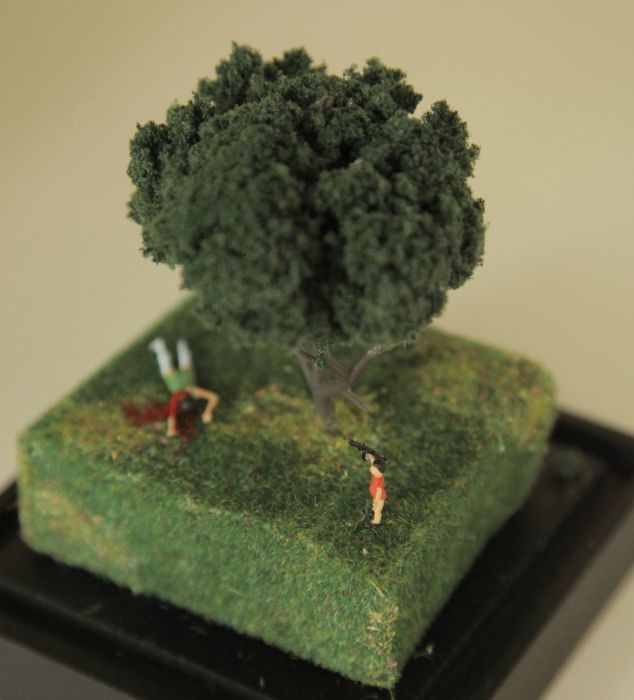|
|
Miniature Diorama Violent Model Scene
|
The Diorama was a popular entertainment that originated in Paris in 1822. An alternative to the also popular "Panorama" (panoramic painting), the Diorama was a theatrical experience viewed by an audience in a highly specialized theatre. As many as 350 patrons would file in to view a landscape painting that would change its appearance both subtly and dramatically. Most would stand, though limited seating was provided. The show lasted 10 to 15 minutes, after which time the entire audience (on a massive turntable) would rotate to view a second painting. Later models of the Diorama theater even held a third painting.
The size of the proscenium was 24 feet (7.3 m) wide by 21 feet (6.4 m) high (7.3 meters x 6.4 meters). Each scene was hand-painted on linen, which was made transparent in selected areas. A series of these multi-layered, linen panels were arranged in a deep, truncated tunnel, then illuminated by sunlight re-directed via skylights, screens, shutters, and colored blinds. Depending on the direction and intensity of the skillfully manipulated light, the scene would appear to change. The effect was so subtle and finely rendered that both critics and the public were astounded, believing they were looking at a natural scene.
The inventor and proprietor of the Diorama was Louis Jacques Mandé Daguerre (1787–1851), formerly a decorator, manufacturer of mirrors, painter of Panoramas, and masterly designer and painter of theatrical stage illusions. Daguerre would later co-invent the daguerreotype, the first widely used method of photography.
Daguerre opened a second Diorama in Regent's Park in London in 1823, a year after the debut of his Paris original. The building which exhibited the diorama, was designed by Augustus Charles Pugin, father of the notable English architect and designer Augustus Welby Northmore Pugin. The show was a popular sensation, and spawned immediate imitations. British artists like Clarkson Stanfield and David Roberts produced ever-more elaborate dioramas through the 1830s; sound effects and even living performers were added. Some "typical diorama effects included moonlit nights, winter snow turning into a summer meadow, rainbows after a storm, illuminated fountains," waterfalls, thunder and lightning, and ringing bells. A diorama painted by Daguerre is currently housed in the church of the French town Bry-sur-Marne, where he lived and died.
|
|









